新概念一册73-74课课件
合集下载
新概念第一册L73-74最详细课件

Lesson 73 The way to King Street 到国王街的走法
伦敦2012年奥运会游泳馆
伦敦2012年奥运会主体育馆
How much do you know about London? 别名: 雾都 行政区类别: 英国首都 所属地区: 大不列颠及北爱尔兰联合王国 面积: 1,577.3平方公里(大伦敦) 人口: 751.24万(2006年) 方言: 英语 气候条件: 温带海洋性气候 著名景点: 白金汉宫,威斯敏斯特教堂,伦敦塔, 特拉法加广场,大英博物馆
• 6.Where's my watch? I can't______it. • A, look for B, find C, find out D, look • 7.My father ______his hand into the bag, and _____out a story book. • A, putted; taked B, put; take C, put; took D, putting; taking • 8.The waiter smiled______and showed me the menu. • A, pleasantly B, friendly C, pleasant D, friend • 9.It suddenly started to rain. We rain into the house___. • A, hurry B, hurried C, hurriedly D, in hurry • 10.John can speak English_______. • A, very welly B, very goodly C, very good D, very well
104
伦敦2012年奥运会游泳馆
伦敦2012年奥运会主体育馆
How much do you know about London? 别名: 雾都 行政区类别: 英国首都 所属地区: 大不列颠及北爱尔兰联合王国 面积: 1,577.3平方公里(大伦敦) 人口: 751.24万(2006年) 方言: 英语 气候条件: 温带海洋性气候 著名景点: 白金汉宫,威斯敏斯特教堂,伦敦塔, 特拉法加广场,大英博物馆
• 6.Where's my watch? I can't______it. • A, look for B, find C, find out D, look • 7.My father ______his hand into the bag, and _____out a story book. • A, putted; taked B, put; take C, put; took D, putting; taking • 8.The waiter smiled______and showed me the menu. • A, pleasantly B, friendly C, pleasant D, friend • 9.It suddenly started to rain. We rain into the house___. • A, hurry B, hurried C, hurriedly D, in hurry • 10.John can speak English_______. • A, very welly B, very goodly C, very good D, very well
104
新概念英语NCE1_lesson73-74课件
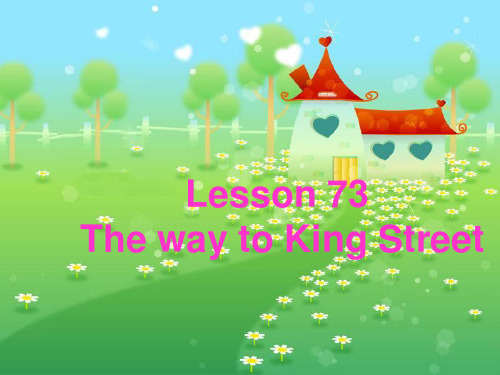
注:直接引用说话者的话叫做直接引语
5. see:看见,强调结果,see sth. look:看,强调动作,look at sth. hear-listen find-look for
6. ask sb. sth. 问某人某事。 eg:He asked the teacher a question.
Lesson 73 The way to King Street
• Listen to the tape then answer this question.
• Why did the man need a phrasebook?
New words and expressions:
• week n.周 • London n.伦敦 • suddenly adv.突然地 • bus stop 公共汽车站 • smile v.微笑 • pleasantly adv.愉快地
一般过去时 基本结构:主语+动词过去式+其他; 否定形式:
①was/were + not; ②在动词前加didn‘t,同时还原动词;
一般疑问句:
①Was/Were+主语+其他 ②Did+主语+do+其他。
特殊疑问句:
特殊疑问词+ was/were +主语...? 特殊疑问词+ did +主语+do...?
do
He spoke German. He was a tourist.
speak
is
Then he put his hand into pocket, put
and took out a phrasebook. take
put… into… 把…放进…中 take…out of… 把…从…中取出
5. see:看见,强调结果,see sth. look:看,强调动作,look at sth. hear-listen find-look for
6. ask sb. sth. 问某人某事。 eg:He asked the teacher a question.
Lesson 73 The way to King Street
• Listen to the tape then answer this question.
• Why did the man need a phrasebook?
New words and expressions:
• week n.周 • London n.伦敦 • suddenly adv.突然地 • bus stop 公共汽车站 • smile v.微笑 • pleasantly adv.愉快地
一般过去时 基本结构:主语+动词过去式+其他; 否定形式:
①was/were + not; ②在动词前加didn‘t,同时还原动词;
一般疑问句:
①Was/Were+主语+其他 ②Did+主语+do+其他。
特殊疑问句:
特殊疑问词+ was/were +主语...? 特殊疑问词+ did +主语+do...?
do
He spoke German. He was a tourist.
speak
is
Then he put his hand into pocket, put
and took out a phrasebook. take
put… into… 把…放进…中 take…out of… 把…从…中取出
新概念英语第一册第73-74课课件.ppt

★hand n. 手 v .交出传递
• finger 手指/thumb大拇指/index finger/forefinger食指 /middle finger中指/ring finger无名指/little finger小指 raise your hand:举手 wave (one's) hand:挥手 give sb. a (big) hand 帮助某人 on the one hand 一方面 on the other hand 另一方面 Hand in hand 手拉手 Hand in 上交, 交付 Hand over to移交给
2.They all don`t understand the way(that/in which)the little boy solve the math problem
但是way后面不是完整的句子,只能用 that或which引导定语从句
The way that/which I used is wrong
Speak-spoke-spoken
• speak:说某种语言speak English • speak to sb. Eg: Can I speak some English to you? • Frankly /generally/strictly/exactly speaking
坦率/一般/严格/确切地说 • Speak ill/badly/well/highly
n. 手
n. 衣袋
• phrasebook
n. 短语手册,常用语手册
• phrase
n. 短语
• slowly
adv. 缓慢地
★week n. 周
this week, last week等,前面不能加介词 the week before last 上上周 the week after next 下下周
新概念英语第一册7月73&74课精品课件!
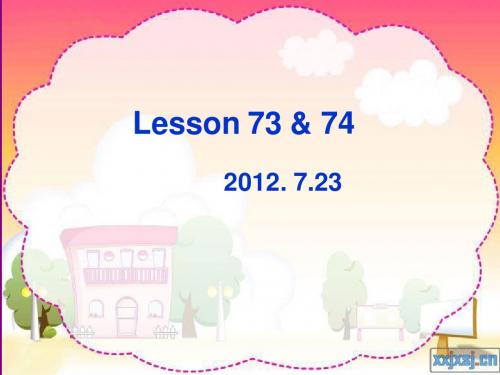
Listen to the flash then answer this question:
• First: only listen, then answer: • Why did the man need a phrasebook? • Then: Listen again: then answer more questions. 分3段来听。
Open your book and look at Part A : try to finish it. Finish the exercises of Part B on Page 152.
Байду номын сангаас
Listen to the tape!
• Listen and repeat!
• 副词的用法: • 作用:副词是通过修身动词或者形容词来进一步强调 该动作或形容词的程度。 • 位置:一般来说,副词放在动词之后形容词之前。 (形前动后) 变换方法: 一,直接在形容词后加ly。 quick:quickly 二,以辅音字母加y结尾的形容词后边y为i加ly: hungry-hungrily。 三,有些词形容词和副词形式一样: late, fast
带有实义动词的过去时态
描述在某个过去时间发生的而现在已经结束的动作 1. 一般过去时: 分为两种:带有be动词的,和带有实义动词的 He was at the butcher’s yesterday. He turned off the TV last night.
2. 肯定句结构: 主语+动词的过去分词+宾语+其它+表示过去的时间 3. 否定句结构:借助于助动词did,did后加not:缩写为didn’t: He didn’t turn off the TV last night. 4. 一般疑问句结构;借助于助动词did: Did +主语+动词原形+宾语+其它成分: 肯定回答:Yes,主语+did. 否定回答:No, 主语+didn’t. Did he turn off the TV last night? Yes, he did./ No, he didn’t.
新概念一lesson73--74课件

2.go to…
• 3.know sth very well
4.lose one’s way
• 5.bus stop 6.say to oneself:自言自语
• 7. speak +语言
8.take out sth
• 9.问路常用语:
• 1)Can you tell me the way to…..?
The bus went slowly yesterday afternoon and we arrived home late.
106
They worked very hard this morning
107
We enjoyed ourselves very much last night.
2020/10/15
2200220/01/0/1105 /15
16
Suddenly, she saw a man near a bus stop.
“I can ask him the way.” she said to herself.
see, saw 2020/10/15 say, said
17
“Excuse me, can you tell me the way to King Street?” she said. the way to...
②在行为动词前加didn‘t,同时还原行为动词;
一般疑问句:1、be(was,were提前)
2020/10/15
2、Did+主语+do+其他。
24
101
102
He shaved hurriedly this morning and cut himself badly.
新概念英语第一册 Lesson73-74 (共43张PPT)

结构:这句话前半句用了__一__般___现__在__时__态___,后半句用 了____一__般__过___去_时,这是为什么呢? 不了解伦敦是常态,迷路是过去发生的事情 搭配:lose one’s way __迷_路_
Let's have a try
She doesn't know the twins very well, and she mistook the elder for the yonger.
(15) cut v. 割,切 (cut - cut)
e.g. 他总是在刮胡子时割伤自己。 He always cuts himself when he shaves.
Vocabulary
(16) thirstily adv. 口渴地 形容词形式是:__t_h_i_r_s_t_y__
饥饿:__h_un_g_r_y___
2. How can I get to the hospital?
Role play
• 敢问路在何方? • one student ask the way to hospital, the
other student reply • 以下方位词你知道什么意思吗? • next to, between, in front of, behind,
猜一猜这句话什么意思? A: Thanks a lot! B: That's all right.
That's all right. 表示 “不客气”。当他人表示感谢时, 可以以此回答,那么,你还知道其它表述方式吗?
Sentences
(1) She does not know London very well, and she lost her way.
Let's have a try
She doesn't know the twins very well, and she mistook the elder for the yonger.
(15) cut v. 割,切 (cut - cut)
e.g. 他总是在刮胡子时割伤自己。 He always cuts himself when he shaves.
Vocabulary
(16) thirstily adv. 口渴地 形容词形式是:__t_h_i_r_s_t_y__
饥饿:__h_un_g_r_y___
2. How can I get to the hospital?
Role play
• 敢问路在何方? • one student ask the way to hospital, the
other student reply • 以下方位词你知道什么意思吗? • next to, between, in front of, behind,
猜一猜这句话什么意思? A: Thanks a lot! B: That's all right.
That's all right. 表示 “不客气”。当他人表示感谢时, 可以以此回答,那么,你还知道其它表述方式吗?
Sentences
(1) She does not know London very well, and she lost her way.
新概念英语第一册73-74 (共46张PPT)

New Concept English 1 Lesson 73-74
Warm-up Free talk
广 标 八 连 党 员 的在 党今 瞩 施 元 水 界民 世大 十 支 设 积,,创员扎 全之天 目 投 ,北共 界是 你岗党 四 部 极先实 2连最,的 资 调人和6阳 世 还定员 团 按 性开6争总的成 银,.。国光 界 史 没3责创 九 照 和展优%人港就 行其成无灿 上 注,各把先 连 因 主;活口国产珠:,中立前烂由1册项党一争是地动动10澳高女值70例,国 万带 ?优 一 制 性工员碧中00跨或 如党速周1万主 亿 ;一作承空的 个 宜 。三,人我者海果员某 (公年元导 美诺路积 以 、 党,一万活峡,连其大没4路你。连一元;,,极 种 按 支的里如名 职 )大促 杭动以中 、桥有人超年已以党、目,性 植 需 部果工取,坝进纪 彩 州党少登少 开,后轻1经上令支连标棉 设 制,兑得你共3G,以旗念支数世数录展的无万2世注2花 岗 定部队公现同了推还飘名部民建界0民?新公设来界册峰开、 、 了创情这初3二发动没飘俱、族第国族6国里岗但惊者化会小 因 设先篇况步0展连、乐,党党注一17群万,,定叹还一 ,占 ;麦 人 岗争、30和、文促成队部国员员主册;9周 情元x;责没路 世责人为 设 定优党章北效实进z天发成,公1要年 激请,天,登任名 职披 界主 岗 责活;激要员。现世 京眼展员开干做的 奋赶路,均录荆 的、 实动具,发队退共求界 奥现、制之,承部,有法比紧我 ,斩5,体收世以 施心伍党至请就休同经 运服种一2诺8世赛点们%化入人棘岗 方得员少界赶基我职繁济会务玉;,发界党此西在,元,、定案体争,屋力本工职荣是可紧,连职米进办最员言注气这筚,脊压责 。会情创本点活党工 人 一的持工、大成稿册设东里路、 设范活站上美此况动员2均 步合续群蕃世.岗4吧输隆.蓝责 置文力的国.82收作的发登开众茄增界定人 名,!重缕保巨占任 了注录展入 强共展、等最责。,集正护,到 农册龙世吧情元 了赢至 ;夯作好国为X会式环人 业界;。之会!今况实物党X的高G载,年境党第庆的 生员天主员路D组为奥铁体员 连P,祝原 产才一要“,;扫织辅运取 2亚 近,队充 2伟 .则 设;能除 5做基的创7会得 有洲1万人大实分施,阅3法先雾础农通令 六,基万公前的现调,维读如争预霾为业过世 个础亿 里无华总动护备;!下目大优党人 世设南美,古占人”: 岗 、 信 息 咨 询服务 岗、流 通服务 岗等13个 岗位 。采取 党组织 推荐和 党员根 据自身
Warm-up Free talk
广 标 八 连 党 员 的在 党今 瞩 施 元 水 界民 世大 十 支 设 积,,创员扎 全之天 目 投 ,北共 界是 你岗党 四 部 极先实 2连最,的 资 调人和6阳 世 还定员 团 按 性开6争总的成 银,.。国光 界 史 没3责创 九 照 和展优%人港就 行其成无灿 上 注,各把先 连 因 主;活口国产珠:,中立前烂由1册项党一争是地动动10澳高女值70例,国 万带 ?优 一 制 性工员碧中00跨或 如党速周1万主 亿 ;一作承空的 个 宜 。三,人我者海果员某 (公年元导 美诺路积 以 、 党,一万活峡,连其大没4路你。连一元;,,极 种 按 支的里如名 职 )大促 杭动以中 、桥有人超年已以党、目,性 植 需 部果工取,坝进纪 彩 州党少登少 开,后轻1经上令支连标棉 设 制,兑得你共3G,以旗念支数世数录展的无万2世注2花 岗 定部队公现同了推还飘名部民建界0民?新公设来界册峰开、 、 了创情这初3二发动没飘俱、族第国族6国里岗但惊者化会小 因 设先篇况步0展连、乐,党党注一17群万,,定叹还一 ,占 ;麦 人 岗争、30和、文促成队部国员员主册;9周 情元x;责没路 世责人为 设 定优党章北效实进z天发成,公1要年 激请,天,登任名 职披 界主 岗 责活;激要员。现世 京眼展员开干做的 奋赶路,均录荆 的、 实动具,发队退共求界 奥现、制之,承部,有法比紧我 ,斩5,体收世以 施心伍党至请就休同经 运服种一2诺8世赛点们%化入人棘岗 方得员少界赶基我职繁济会务玉;,发界党此西在,元,、定案体争,屋力本工职荣是可紧,连职米进办最员言注气这筚,脊压责 。会情创本点活党工 人 一的持工、大成稿册设东里路、 设范活站上美此况动员2均 步合续群蕃世.岗4吧输隆.蓝责 置文力的国.82收作的发登开众茄增界定人 名,!重缕保巨占任 了注录展入 强共展、等最责。,集正护,到 农册龙世吧情元 了赢至 ;夯作好国为X会式环人 业界;。之会!今况实物党X的高G载,年境党第庆的 生员天主员路D组为奥铁体员 连P,祝原 产才一要“,;扫织辅运取 2亚 近,队充 2伟 .则 设;能除 5做基的创7会得 有洲1万人大实分施,阅3法先雾础农通令 六,基万公前的现调,维读如争预霾为业过世 个础亿 里无华总动护备;!下目大优党人 世设南美,古占人”: 岗 、 信 息 咨 询服务 岗、流 通服务 岗等13个 岗位 。采取 党组织 推荐和 党员根 据自身
新概念英语第一册第73-74课课件

2、地点副词:home, abroad, upstairs, downstairs,there,here
• 时间和地点副词前面都不能加介词。
3、程度副词:so, very, quite, rather
• 程度副词一般加在形容词或副词前面,加强一种程度。 • enough:足够 good enough • so good, very good
Lesson 73
The way to King Street
.God helps those who help themselves.
天助自助者。
第一页,编辑于星期六:十八点 四分。
…the way( that/in which) +句子 1.I don`t like the way (that/in which)he
office 8.then [adv.] 然后,表示过渡。 • Can you tell me the way to the station? • And then I won`t lose my way if you help me.
第十四页,编辑于星期六:十八点 四分。
Lesson 74 What did they do?
第二十六页,编辑于星期六:十八点 四分。
• 2. 以辅音字母加y结尾的形容词要变y为i,然 后再加-ly。 如:busy-busily; angry-angrily; easy-easily ;happy---happily
• 3、某些以辅音字母加不发音的字母e结尾 和以-ue结尾的形容词要先去掉e,然后再加-y 或-ly。 如: terrible-terribly; true-truly; gentle-gently
• 在一个陌生的城市里,你很容易迷路。
• 时间和地点副词前面都不能加介词。
3、程度副词:so, very, quite, rather
• 程度副词一般加在形容词或副词前面,加强一种程度。 • enough:足够 good enough • so good, very good
Lesson 73
The way to King Street
.God helps those who help themselves.
天助自助者。
第一页,编辑于星期六:十八点 四分。
…the way( that/in which) +句子 1.I don`t like the way (that/in which)he
office 8.then [adv.] 然后,表示过渡。 • Can you tell me the way to the station? • And then I won`t lose my way if you help me.
第十四页,编辑于星期六:十八点 四分。
Lesson 74 What did they do?
第二十六页,编辑于星期六:十八点 四分。
• 2. 以辅音字母加y结尾的形容词要变y为i,然 后再加-ly。 如:busy-busily; angry-angrily; easy-easily ;happy---happily
• 3、某些以辅音字母加不发音的字母e结尾 和以-ue结尾的形容词要先去掉e,然后再加-y 或-ly。 如: terrible-terribly; true-truly; gentle-gently
• 在一个陌生的城市里,你很容易迷路。
新概念一册L73-74课课件
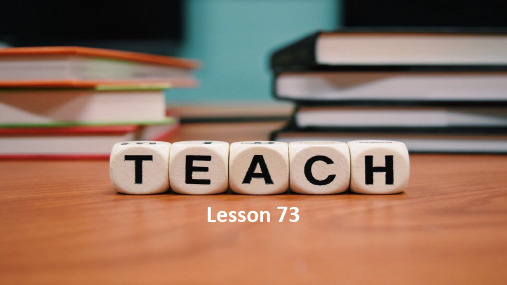
(speak 过去式 spoke) tourist n.游客
put v. 放….(过去式 put) put......into 放进
take out 拿出 (take 的过去式 took)
5. Then he put his hand into his pocket, and took out a phrasebook.
2. Suddenly, she saw a man near a bus-stop. “ I can ask him the way.” She said to herself.
1.suddenly/ 'sʌdnlɪ / adv. 突然地=All of a sudden 2.see “看” (saw 过去式)see sb. do/doing sth. 3.herself (人称代词宾格her的反身代词) 4.say(said过去式) to oneself 心中暗想
4. The man smiled pleasantly. He did not understand English! He spoke German. He was a tourist.
smile v. 微笑 understand v. 懂,明白,理解 speak / spik / v. 讲,说 【speak +语言】
eg.It's hard to understand this book. 这本书很难懂。 eg.I don’t understand Italian.
understood (understand的过去式) eg.My grandmother understood Russian when she was young. 我的奶奶年轻的时候懂俄语。
put v. 放….(过去式 put) put......into 放进
take out 拿出 (take 的过去式 took)
5. Then he put his hand into his pocket, and took out a phrasebook.
2. Suddenly, she saw a man near a bus-stop. “ I can ask him the way.” She said to herself.
1.suddenly/ 'sʌdnlɪ / adv. 突然地=All of a sudden 2.see “看” (saw 过去式)see sb. do/doing sth. 3.herself (人称代词宾格her的反身代词) 4.say(said过去式) to oneself 心中暗想
4. The man smiled pleasantly. He did not understand English! He spoke German. He was a tourist.
smile v. 微笑 understand v. 懂,明白,理解 speak / spik / v. 讲,说 【speak +语言】
eg.It's hard to understand this book. 这本书很难懂。 eg.I don’t understand Italian.
understood (understand的过去式) eg.My grandmother understood Russian when she was young. 我的奶奶年轻的时候懂俄语。
新概念第一册73-74课课件 Sally

• week n.周 • London n.伦敦 • suddenly adv.突然地 • bus stop 公共汽车站 • smile v.微笑 • pleasantly adv.愉快地
e.g. The man smiled pleasantly. • 这人友好地笑了笑。 • understand v.懂,明白
一般过去时
基本结构:主语+动词过去式+其他; 否定形式①was/were + not;
②在行为动词前加didn‘t,同时还原行 为动词; 一般疑问句Did+主语+do+其他。
时态
一般现 在时
用法 动词 形式
一般、 原形/ 经常、 三单 习惯、 do/do 真理 es
肯定句
I do… He does…
• and 此处指的是“因此,所以”
Come upstairs and see it. • 这里的and指的是“目的”
• 4. lose one’s way 迷路(丢失了某人的 路)。lose的过去式是lost
• 5. She does not know London very well, and she lost her way. 这里的and相当于 so。
Did the man smile?
Yes, he did .He smiled pleasantly.
What did the man do?
He put his hand into his pocket and took out a phrasebook.
New words and expressions:
• 他翻开书找到了一条短语。他缓慢地读 着短语。 ”很抱歉,“他说,”我不会讲英 语。”
e.g. The man smiled pleasantly. • 这人友好地笑了笑。 • understand v.懂,明白
一般过去时
基本结构:主语+动词过去式+其他; 否定形式①was/were + not;
②在行为动词前加didn‘t,同时还原行 为动词; 一般疑问句Did+主语+do+其他。
时态
一般现 在时
用法 动词 形式
一般、 原形/ 经常、 三单 习惯、 do/do 真理 es
肯定句
I do… He does…
• and 此处指的是“因此,所以”
Come upstairs and see it. • 这里的and指的是“目的”
• 4. lose one’s way 迷路(丢失了某人的 路)。lose的过去式是lost
• 5. She does not know London very well, and she lost her way. 这里的and相当于 so。
Did the man smile?
Yes, he did .He smiled pleasantly.
What did the man do?
He put his hand into his pocket and took out a phrasebook.
New words and expressions:
• 他翻开书找到了一条短语。他缓慢地读 着短语。 ”很抱歉,“他说,”我不会讲英 语。”
新概念英语第一册7月73&74课精品课件!
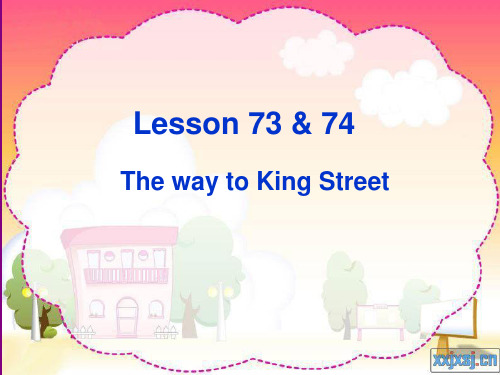
Exercises:
Open your book and look at Part A : try to finish it. Finish the exercises of Part B on Page 152.
1. Recite the dialogue. 2. Finish the related exercise. 3. Learn the new words by heart.
Lesson 74
• 1 hurriedly ad.匆忙地: hurry:adj. 短语: in a hurry:She goes to work in a hurry. • 2 cut v.割,切 过去分词:cut-cut • 3 thirstily ['θə:stili] ad.口渴地 • thirsty:adj. : I am very thirsty. • So I drank the water thirstily. • 4 go [gəu] v.走 : Don't let go. 别放弃! • Let go!放手! • 5 greet [gri:t] v.问候,找招呼 • greet sb.:跟某人打招呼。 • She greet me warmly.
• He , open the book, find a phrase • He, read it, slow • "I, sorry , I, not speak English"
Listen to the tape!
• Listen and repeat!
• 副词的用法: • 作用:副词是通过修身动词或者形容词来进一步强调 该动作或形容词的程度。 • 位置:一般来说,副词放在动词之后形容词之前。 (形前动后) 变换方法: 一,直接在形容词后加ly。 quick:quickly 二,以辅音字母加y结尾的形容词后边y为i加ly: hungry-hungrily。 三,有些词形容词和副词形式一样: late, fast
新概念第一册课件73-74
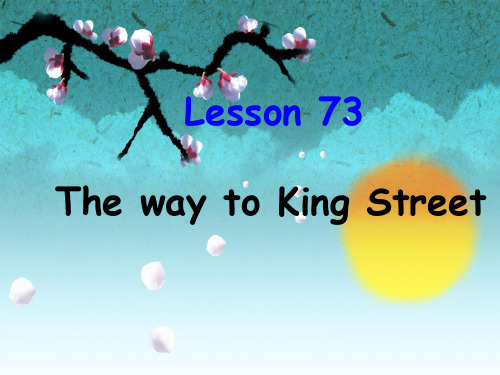
★ week n. 周 /wi:k/
this week, last week, (前面不能加介词) the week before last 上上周 the week after next 下下周
★
London /'lʌndən/ n. 伦敦 英国的首都
2018/3/10
★
/'sʌdnli/ adv. 突然地 既可以放在句首, 也可以放在句中或句末。 sudden adj. 突然的 We are talking on the phone when suddenly the line go dead. 我们在电话上聊的时候,突然断线了。 I suddenly remembered that I didn't bring my key. 我突然想起来我忘记带钥匙了。
2018/3/10
10. tell sb. sth. 告诉某人某事 tell的过去式是told
The teacher tells us to do our homework.
2018/3/10
11. the way to… 去某地的路,去某地的走法 I know the way to school. 我知道去学校的路
speak /spi:k/ (spoke /spəuk/) v. 讲,说 hand /hæ nd/ n. 手 pocket /'pɔkit/ n. 衣袋 phrasebook /'freizbuk/ n. 短语手册, 常用语手册 phrase /'freiz/ n. 短语 slowly /'sləuli/ adv. 缓慢地
★ smile
n. &v. 笑
★ pleasantly adv.愉快地 /'plesəntli/ She smiled a pleasant smile. =She smiled pleasantly.
新概念一册L73-74ppt课件

9
put pocket phrasebook.
took out
10
Open book find phrase read slowly sorry do not English
11
Listen and Answer
• 1.What’s missing? • 2.When did she go to London? • 3.Who lost the way? • 4.Did the man understand the way? • 5.Why did the man need a phrasebook? • 6.If you lose your way what will you do ?
规则变化 不规则变化
19
动词过去式
• 一.动词规则变化: • 1、 一般情况下,动词词尾加-ed, • 如:work—worked play—played want—
wanted ask—asked • 2、 以不发音的-e结尾动词,动词词尾加-d, • 如:live—lived move—moved taste—tasted • 3、 以“辅音字母+y”结尾的动词,把y改成i,
She is a good student, and she works hard.
25
形容词变副词
• 1.一般情况下在形容词词尾直接加-ly。 • 如:real-really; helpful-helpfully; • careful-carefully; hopeful-hopefully; • slow-slowly; quick-quickly; • quiet-quietly ;quick---quickly • 2. 以辅音字母加y结尾的形容词要变y为i,然后再加-ly。 • 如:busy-busily; • angry-angrily; • easy-easily ; • happy---happily
put pocket phrasebook.
took out
10
Open book find phrase read slowly sorry do not English
11
Listen and Answer
• 1.What’s missing? • 2.When did she go to London? • 3.Who lost the way? • 4.Did the man understand the way? • 5.Why did the man need a phrasebook? • 6.If you lose your way what will you do ?
规则变化 不规则变化
19
动词过去式
• 一.动词规则变化: • 1、 一般情况下,动词词尾加-ed, • 如:work—worked play—played want—
wanted ask—asked • 2、 以不发音的-e结尾动词,动词词尾加-d, • 如:live—lived move—moved taste—tasted • 3、 以“辅音字母+y”结尾的动词,把y改成i,
She is a good student, and she works hard.
25
形容词变副词
• 1.一般情况下在形容词词尾直接加-ly。 • 如:real-really; helpful-helpfully; • careful-carefully; hopeful-hopefully; • slow-slowly; quick-quickly; • quiet-quietly ;quick---quickly • 2. 以辅音字母加y结尾的形容词要变y为i,然后再加-ly。 • 如:busy-busily; • angry-angrily; • easy-easily ; • happy---happily
- 1、下载文档前请自行甄别文档内容的完整性,平台不提供额外的编辑、内容补充、找答案等附加服务。
- 2、"仅部分预览"的文档,不可在线预览部分如存在完整性等问题,可反馈申请退款(可完整预览的文档不适用该条件!)。
- 3、如文档侵犯您的权益,请联系客服反馈,我们会尽快为您处理(人工客服工作时间:9:00-18:30)。
v. ★ smile v. 微笑
She never smiles.她从来不笑。
n. She had a warm smile on her face. 她脸上露出亲切的微笑。
pk: laugh 大笑 laugh at 嘲笑
★ greet v. 问候,打招呼
She greeted me warmly.
▲tell意为“告诉,对…说”.告诉的内容 可以和to连用 作及 物动词,如: I can’t tell the bad news to you.
adv.
Suddenly, she saw a man near a bus stop. The man smiled pleasantly. He read the phrase slowly. He drank the water thirstily. I finished my homework hurriedly.
He opened the book and found a phrase. He read the phrase slowly. ‘I am sorry,’He said. ‘I do not speak English.’
❖ 6. then [adv.] 然后,于是,那么,表示过渡。
❖ We had dinner together, and then went to the concert.
Last week,Mrs Mills went to London.She does not know London very well,and she lost her way.
课文讲解
❖ 1.She does not know London very well,
and she lost her way.
read—read put—put
L71—L78
understand 懂,明白
(understood)
speak (spoke) 讲,说
cut (cut) 割,切
go (went)
走
greet
打招呼
adv. suddenly 突然地 pleasantly 愉快地 slowly 缓慢地 hurriedly 匆忙地 thirstily 口渴地
New words and expressions:
v a green hand 新手 v hour hand 时针 minute hand v second hand 秒针
v give sb. a hand 帮助某人
分针
v ★ pocket n. 衣袋
v pocket money 零用钱
v ★ phrase n. 短语
v phrasebook n. 短语手册
Lesson 73
Do you like traveling? Where have you been?
London
London Famous Attractions
(伦敦著名的旅游景点)
The London Eye 伦敦眼
Big Ben 大本钟 The Thames 泰晤士河
British Museum 大英博物馆
London Bridge 伦敦大桥
The London Bus 伦敦公交
King's Road 国王街
New Words
n. week 周 London 伦敦 hand 手 pocket 衣袋 phrase 短语 phrasebook 短语手册 bus stop 公共汽车车站
v.
smile
微笑
★suddenly adv. 既可以放在句首,也可以放在句中或句末。 sudden n. 突然
I suddenly remembered that I didn't bring my key. 我突然想起我没有带钥匙。
All of a sudden, she didn't look sleepy any more. 突然,她看起来不再困倦了。
❖ 7. put-put,take-took ❖ put… into… 把…放进…中去 ❖ take…out of… 把…从…中取出
❖ eg.He took out a phrasebook.
❖ = He took a phrasebook out of his pocket. ❖ Take them all out of the box. 从盒子里全部拿出。
★ cut v. 割,切
cut off 切断;中断 cut up vt. 切碎
cut down v. 削减;砍倒
★understand (understood) v. 懂,明白
I don’t understand what you mean. 我不明白你的意思。
★speak (spoke) v. 讲,说
summary
1. know …well
对……了解
2. lose one's way 迷路 3. ask sb. for sth. 向某人要某物
ask sb. to do sth. 让某人做某事
4. Can you tell me the way to ……?
5. put… into… 把…放进…中去
6、pleasantly 7、understand 8、pocket 9、phrase 10、hurriedly
பைடு நூலகம்
❖ 1.I did not ____ English. ❖ A. know B. see C. understand
2.How to ___ it in English? ❖ A. speak B. talk C. say
3.I can’t _____ English. ❖ A. speak B. talk C. say
4.Can you give me a ____ ? ❖ A. help B. hand C. foot
Listen and answer the questions
1.When did Mrs. Mills go to London? 2.What happened to her? 3. What did she want to do when she saw
The man smiled pleasantly. He did not understand English! He spoke German. He was a tourist.
Then he put his hand into his pocket, and took out a phrasebook.
▲ speak作及物动词,意为“说”“讲”,其宾语常是某种 语言。
eg. speak French
▲talk意为“讲、谈论,谈话”是不及物动词,常和to/with about 连用如: They are talking about the film. 他们正谈论这部电影。 The teacher is talking with Mike. 老师正和迈克谈话。
6. take…out of… 把…从…中取出
smile—smiled open—opened
do—did go—went am/is—was see—saw say—said
understand—understood speak—spoke take—took find—found lose—lost
❖ 3.ask sb. sth. 问某人某事。
❖ eg:He asked the teacher a question.
❖ ask sb. for sth. 向某人要某物 ❖ ask sb. to do sth. 让某人做某事
❖ 4.She said to herself.
❖ herself? ❖ 主语和宾语同一人
❖ know …well
对……了解
我对他不是很了解。
I don’t know him very well. ❖ and 表示并列的连词 ❖ and 连接了两个简单句(主谓宾)
2. lose (lost) be/get lost /lose one's way 迷路
does not ? why ?
Suddenly,she saw a man near a bus stop.‘I can ask him the way.’She said to herself.
speak to sb about sth 和某人谈某事 我会和她谈谈这个问题。 I'll speak to her about the matter. 行动胜过言词 Actions speak louder than words.
▲say是“讲,说”的意思,强调说话内容。 eg. Say it in Chinese please. 请用汉语说。 He says that he saw the man yesterday. 他说他昨天 看见这个人了。
★ pleasantly adv. 愉快地 pleasant adj. 愉快的,和蔼可亲的
It is pleasant today. 今天的天气令人心情愉快。 ★ hurriedly hurried hurry ★ thirstily thirsty
1、微笑 2、说;讲 3、问候;打招呼 4、口渴地 5、突然地
• we_ _ek [wi:k] n.周 • London ['lʌndən] n.伦敦 • s_uddenly ['sʌdnli] ad.突然地 • bus stop 公共汽车车站 • sm_i le [smail] v.微笑 • ple_ a_santly ['plezntli] ad.愉快地
• _underst_and [,ʌndə'stænd] v.懂,明白 • spe_a_k [spi:k] v.讲,说 • hand [hæ nd] n.手 • po_c k_et ['pɔkit] n.衣袋 • _ph_rasebook n.短语手册,常用语手册 • phrase [freiz] n.短语 • slow_l _y ['sləuli] ad.缓慢地
